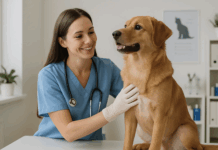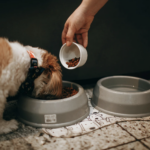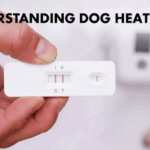Last Updated on March 27, 2023 by Dogs Vets
Essential Oils for Dogs: Safety, Uses, and Benefits
Essential oils have long been used in human wellness practices, but did you know they can also benefit your furry friend? As a natural alternative to traditional treatments, essential oils offer various health benefits to dogs when used correctly.
In this article, we will discuss the safety precautions, uses, and benefits of essential oils for dogs, along with specific oils to consider and how to apply them.
Safety Precautions for Using Essential Oils
Before diving into the world of essential oils for dogs, it’s crucial to understand the safety measures needed to protect your pet.
Not all essential oils are safe for dogs, and using them improperly can lead to harmful consequences. Here are some critical safety precautions to consider:
- Consult your veterinarian: Always consult with your veterinarian before using essential oils on your dog, especially if they have existing health conditions or are on medication.
- Avoid using essential oils on puppies: Puppies have sensitive skin and immature immune systems, making them more susceptible to adverse reactions.
- Keep essential oils away from dogs’ eyes, nose, and mouth: Applying oils to these areas can cause irritation and potentially harm your dog’s respiratory system.
- Use high-quality, pure essential oils: Low-quality or adulterated essential oils may contain harmful chemicals or irritants
How to Choose High-Quality Essential Oils
To ensure the safety and effectiveness of essential oils for your dog, it’s crucial to choose high-quality, pure products. Here are some tips for selecting the best oils:
- Look for reputable brands: Choose well-known, reputable essential oil companies with positive reviews and a history of producing quality products.
- Check for purity: Look for essential oils labeled as “100% pure” or “therapeutic grade.” These oils are undiluted and free of synthetic additives.
- Examine the label: A high-quality essential oil label should include the oil’s common name, botanical name, country of origin, and extraction method.
Benefits of Essential Oils for Dogs
Essential oils offer various benefits for dogs, from promoting calmness to relieving discomfort. Some potential benefits include:
- Reducing anxiety and stress: Lavender, chamomile, and valerian essential oils are known for their calming effects, helping to ease stress and anxiety in dogs.
- Relieving joint and muscle pain: Eucalyptus, ginger, and rosemary essential oils possess anti-inflammatory properties that can alleviate joint and muscle pain.
- Supporting the immune system: Oregano, frankincense, and lemon essential oils can help boost your dog’s immune system, keeping them healthy and resilient.
- Improving skin and coat health: Essential oils like lavender, chamomile, and helichrysum can promote healthy skin and a shiny coat, reducing itching and irritation.
- Repelling pests: Some essential oils, such as cedarwood, peppermint, and lemongrass, can effectively repel fleas, ticks, and other pests.
Top Essential Oils for Common Dog Health Issues
Here are some of the most effective essential oils for addressing common dog health issues:
- Lavender: This versatile oil is known for its calming effects, making it an excellent choice for reducing stress and anxiety. Lavender can also soothe skin irritations and promote restful sleep.
- Chamomile: Chamomile is another calming essential oil that can help reduce anxiety and stress in dogs. It also possesses anti-inflammatory properties, making it suitable for treating skin irritations and inflammation.
- Eucalyptus: With its strong anti-inflammatory properties, eucalyptus is an excellent choice for alleviating joint and muscle pain. It also helps clear congestion and can be used as a natural insect repellent.
- Peppermint: Peppermint essential oil is ideal for cooling and soothing sore muscles. It can also repel pests and improve focus and concentration.
- Frankincense: This oil supports the immune system, reduces inflammation, and promotes overall wellness in dogs.
How to Apply Essential Oils on Dogs
When using essential oils for dogs, it’s important to follow the correct application methods to ensure your pet’s safety. Here are some common methods for applying essential oils:
- Topical application: Dilute the essential oil with a carrier oil, such as coconut oil or almond oil, and gently massage it into your dog’s skin. Focus on areas with thin skin, like the ear flaps, inner thighs, or armpits, for better absorption.
- Diffusion: Use an essential oil diffuser to disperse the oil into the air, creating a calming environment for your dog. Make sure the room has proper ventilation and never leave your dog alone with a diffuser running.
- Spray: Mix a few drops of essential oil with water in a spray bottle and lightly mist your dog’s bedding or toys. This method is excellent for repelling pests or creating a calming atmosphere.
Diluting Essential Oils for Dogs
Dilution is a crucial step when using essential oils on dogs to avoid skin irritation or other adverse reactions. Here’s a general guideline for diluting essential oils for dogs:
- Small dogs (10-30 lbs): Use a 0.25% dilution, which equals 1 drop of essential oil per 4 teaspoons of carrier oil.
- Medium dogs (30-60 lbs): Use a 0.5% dilution, or 1 drop of essential oil per 2 teaspoons of carrier oil.
- Large dogs (over 60 lbs): Use a 1% dilution, or 1 drop of essential oil per teaspoon of carrier oil.
Always start with the lowest dilution and gradually increase if necessary, monitoring your dog for any signs of discomfort or irritation.
Aromatherapy for Dogs
Aromatherapy is the practice of using essential oils to promote physical and emotional well-being.
For dogs, aromatherapy can provide a natural, non-invasive way to address various health concerns. When using aromatherapy for dogs, it’s important to create a safe and relaxing environment by diffusing essential oils in a well-ventilated space.
Ensure your dog can leave the room if they’re uncomfortable with the scent. Remember to consult your veterinarian before introducing any new essential oils into your dog’s routine.
Essential Oils to Avoid for Dogs
While many essential oils are safe and beneficial for dogs, some can be toxic or cause adverse reactions. Here’s a list of essential oils to avoid using on or around dogs:
- Tea tree oil: This oil can be toxic to dogs, causing symptoms like vomiting, diarrhea, and lethargy.
- Cinnamon: Cinnamon essential oil can cause skin irritation and allergic reactions in dogs.
- Clove: Clove oil can cause skin and mucous membrane irritation and can be toxic if ingested.
- Thyme: Thyme essential oil can be irritating to dogs’ skin and respiratory systems.
- Pennyroyal: This oil is toxic to dogs and can cause liver damage and other severe health issues.
Always exercise caution when using essential oils on or around your dog, and consult your veterinarian if you’re unsure about a specific oil.
Conclusion
Essential oils can offer numerous benefits to dogs when used safely and responsibly.
From promoting relaxation to supporting immune function, these natural remedies can improve your dog’s well-being without relying on harsh chemicals or medications.
Remember to consult your veterinarian, choose high-quality oils, and follow proper dilution and application guidelines to ensure your pet’s safety and comfort.
FAQs
Q1. Can I use essential oils on my puppy?
A. It’s generally not recommended to use essential oils on puppies, as they have sensitive skin and immature immune systems. Consult your veterinarian for alternative methods to address your puppy’s health concerns.
Q2. How can I tell if my dog is having an adverse reaction to an essential oil?
A. Signs of an adverse reaction may include excessive drooling, vomiting, diarrhea, lethargy, difficulty breathing, or skin irritation. If you suspect your dog is having a reaction, discontinue use immediately and consult your veterinarian.
Q3. Can I use essential oils to treat my dog’s health issues instead of conventional medications?
A. Essential oils should not replace prescribed medications without consulting your veterinarian. They can be used as a complementary therapy alongside traditional treatments but should not be relied on as a sole treatment option.
Q4. Can I use essential oils on my dog’s collar?
A. You can apply a few drops of diluted essential oil to your dog’s collar, but be cautious not to use too much, as it can cause skin irritation or be overwhelming for your dog’s sense of smell.
Q5. How often should I apply essential oils to my dog?
A. The frequency of essential oil application depends on your dog’s specific needs and the oil being used. Consult your veterinarian for personalized recommendations based on your dog’s health and well-being.
Q6. Are essential oils safe for cats and other pets?
A. Cats and other pets may have different sensitivities to essential oils compared to dogs. Always consult with a veterinarian who specializes in the care of your specific pet before using essential oils.’
Q7. Can I use human essential oil products on my dog?
A. Human essential oil products may not be suitable for dogs due to differences in concentration and formulation. It’s best to use products specifically designed for pets or pure essential oils diluted appropriately for dogs.
Fact Check
We hope you enjoyed reading this article. What are your thoughts on the topic?
“At [Dogsvets.com], our goal is to bring you the most accurate and up-to-date information on all things pet-related.
If you have any additional insights or would like to advertise with us, don’t hesitate to get in touch.
If you notice any errors or discrepancies in our content, please let us know so we can correct them.
We welcome your feedback and encourage you to share this article with others.”

















